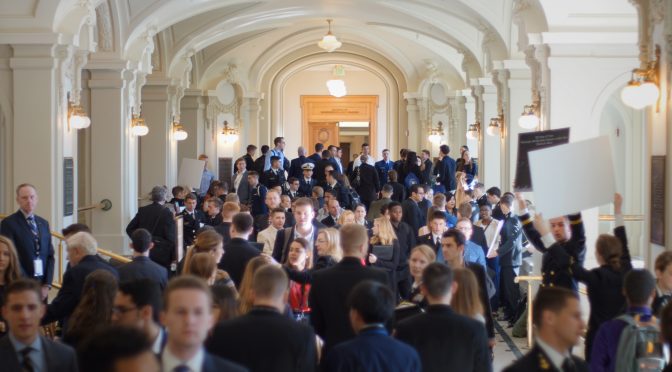By Sally and Michael DeBoer
For the past fifty-six years, the United States Naval Academy has hosted the Naval Academy Foreign Affairs Conference (NAFAC). NAFAC, planned and executed by the midshipmen themselves, brings together outstanding undergraduate delegates as well as notable speakers, scholars, and subject matter experts from around the nation and the world to discuss a cu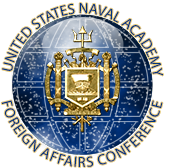 rrent and relevant international relations issue. The theme for this year’s conference, A New Era of Great Power Competition?, seeks to explore the shifting dynamics of the international system, challenges to a U.S. – led world order, the nature of potential future conflicts, the challenge of proto-peer competitors and rising powers, as well as what steps the U.S. might take to remain the primary arbiter of the international system at large. As this topic is of great interest to CIMSEC’s readership, we are proud to partner with NAFAC to bring you a series of near real-time posts from the day’s events in Annapolis. CIMSEC would like to recognize MIDN 1/C Charlotte Asdal, NAFAC Director, and her staff for allowing us to participate in this year’s events and for inviting our readership to virtually share in the week’s rich academic and policy environment.
rrent and relevant international relations issue. The theme for this year’s conference, A New Era of Great Power Competition?, seeks to explore the shifting dynamics of the international system, challenges to a U.S. – led world order, the nature of potential future conflicts, the challenge of proto-peer competitors and rising powers, as well as what steps the U.S. might take to remain the primary arbiter of the international system at large. As this topic is of great interest to CIMSEC’s readership, we are proud to partner with NAFAC to bring you a series of near real-time posts from the day’s events in Annapolis. CIMSEC would like to recognize MIDN 1/C Charlotte Asdal, NAFAC Director, and her staff for allowing us to participate in this year’s events and for inviting our readership to virtually share in the week’s rich academic and policy environment.
Keynote Address: RADM John Kirby (ret)
After introductory remarks from MIDN Charlotte Asdal, NAFAC Director, and VADM Walter E. Carter, Superintendent of the United States Naval Academy, the events of the conference kicked off in earnest with the LCDR J.J. Connell Keynote Address from Rear Admiral John Kirby (Ret), former Pentagon press secretary and State Department Spokesman.
RADM Kirby’s address engaged delegates, midshipmen, and guests largely on the topic of “how the best decisions are reached and communicated.” In keeping with omnipresent military tradition, the admiral introduced his audience to a series of acronyms he suggested would aid future decision-makers faced with difficult decisions. His first example stemmed from his time in Afghanistan. In 2012, faced with escalating violence following a scandal, Kirby recalled his then-boss, Gen. John Allen kept an acronym in mind – NIDBIT – No Decision Before its Time. Artificial pressure to make a decision, he went on to describe, leads to mistakes, and decision-makers and leaders should not “rush to failure.” Reminding oneself of NIDBIT makes for better tactical and policy decisions, and sends a better strategic message, leading to a more credible organization. Not making a decision right away can buy space, allow leaders to define the principal issue, and let values guide their decision making process. Interests are more effectively secured, he elaborated, when they align with your values.
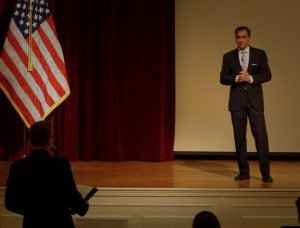
This point led the retired admiral to his next acronym, KIP – Keep it in Perspective. Kirby characterized the current environment as a post-audience world, meaning people are no longer satisfied by knowing what one is doing but why as well. RADM Kirby advised leaders to “stand back from the crush of headlines, the power of myth, and chart a course that when looked back upon reveals the wisdom of your leadership.” Drawing upon wisdom he had received, he surmised that the best leaders see themselves as part of a continuum of events, rather than problem solvers of the moment.
RADM Kirby’s final acronym – WWTS – What Would They Say, informed much of his thought process as a public affairs professional in both a military and civilian context. By keeping an open mind and incorporating a variety of perspectives, even though they may be antithetical to one’s own views, allows a decision-maker to consider rebuttals to tough criticism and lends oneself to “sustainable policy and compromise, good sense, civility, and practicality.” To this end, Admiral Kirby advised audience members to go about following someone they do not agree with on Twitter or some other social media outlet. Social media’s promise of an expanded worldview is a false one, Kirby articulated; indeed, the sheer volume of media and sources makes us self-select what information and perspective we consume – because we can – and this makes a decision-maker’s universe small and myopic. WWTS allows one to resist this.
Kirby’s remarks concluded with a period for questions from the audience. The most widely discussed question came from a delegate who inquired how decision-makers can best account for high degrees of ambiguity from a foreign policy perspective. Admiral Kirby responded that in the foreign policy realm, all actors come with their own interests and may not be as forthcoming [as the United States] – the Russian Federation is, in his experience, a case in point – when actors’ interests and values are not aligned, one must be able and willing to recognize and anticipate reactions. RADM Kirby’s statements set a tone of open-mindedness and questioning for the day ahead.
Round Tables
Round tables, held daily over the three-day span of the conference, provide midshipmen and their peer delegates an opportunity to present their own research and thoughts on a variety of topics germane to the discussion of great power competition in the 21st century. On Tuesday, CIMSEC representatives attended two of these discussions – Springtime for Putin: The Reawakening of the Russian Bear and Anyplace, Anywhere, Anytime: Power Projection and Sea Control in a Multipolar World. Readers can look for select publications from the Round Tables next week, when CIMSEC will share outstanding research essays from delegates.
Panel Discussion: Are We Actually in a New Era of Great Power Competition?
Note: The following information is paraphrased from the panelists’ remarks – their thoughts, remarks, and research are their own and are reproduced here for the information of our audience only.
Moderated by Lt Col (Ret) Scott Cooper, USMC, the first panel of the conference tackled the central question of the week; subject matter expert panelists, including William Ruger, Research Fellow in Foreign Policy Studies at the CATO institute, Shawn Brimley, Executive Vice President and Director of Studies at the Center for a New American Security, and Brigadier General Se Woo Pyo, Republic of South Korea Defense Attache to the United States, characterized the current direction of the international system as it relates to our contemporary understanding of relationships between great powers. Each panelist was given an opportunity to provide foundational remarks in response to an open ended question, followed by a period of questions from the audience.
The CATO Institute’s Mr. William Ruger was asked to elaborate on an assertion he made in his August 2016 piece published on War on the Rocks in which he and his co-author Christopher Preble stated: For decades, U.S. foreign policy has followed a quixotic goal of primacy, or global hegemony. It presumes that the United States is the indispensable nation, and that every problem, in any part of the world, must be resolved by U.S. leadership or else will impact American safety.
Ruger contended that the U.S. has been following a policy of liberal hegemony to preserve its role in the world, and key features of this pursuit include the assumption that most problems in the world are threats to American safety and interests. In this view, he went on to explain, all problems are interconnected, there are no seams, and this assumption requires the U.S. to show resolve and provide leadership on threats proactively and reactively. This policy also requires, Ruger went on to articulate, the U.S. to challenge potential regional hegemons and also aim to spread U.S. values even through use of force, requiring a very large, expensive, and globally deployed military as well as a vast network of allies. Lastly, it requires occasional warfighting to extinguish threats.
The U.S. is a great country, Ruger said, but need not be seen as indispensable to protect and defend its interests. Ruger expressed his doubts regarding the value of primacy based on three major factors, paraphrased below:
1) Washington, DC is a “threat inflation machine,” any kind of problem is inflated, realists see the world as it is and do not engage in threat inflation or naivety, instead choosing to see things “as they are.”
2) Though the U.S. is actually very secure in terms of the global history of great powers, we have internalized a security view that doesn’t check with this reality. The U.S. spends as much as the next eight countries combined on defense, and three times as much as Russia and China combined. Further, nuclear weapons play a key role in reducing any threat to the homeland, and this is unique to this period in history. U.S. conventional deterrence is also high.
3) Geography still matters, and it is still difficult to project power across oceans. We have weak or nonthreatening neighbors, something other great powers in history have not enjoyed.
Mr. Ruger concluded his opening remarks by expressing his doubt that Russia and China are unlikely to become truly peer competitors to the U.S anytime soon. Russia’s economy, for instance, dependent on natural resources, is limping, and so they lack an engine to drive the necessary growth. This is complicated by a deepening demographic crisis. China is a rising power, he conceded, but it still has low per capita GDP, corruption problems, cronyism, environmental challenges, ethnic conflict potential, and no blue water navy comparable to the United States’ current force. The nature of the architecture of A2/AD forces will prevent China from moving from the first island chain. The situation for the U.S. and their allies is actually quite good, Ruger concluded.
Shawn Brimley, Executive Vice President and Director of Studies at the Center for a New American Security, was prompted to discuss his War on the Rocks column: For an Audience of One: Re-booting Agenda SecDef, which is explicitly directed to the Secretary of Defense.
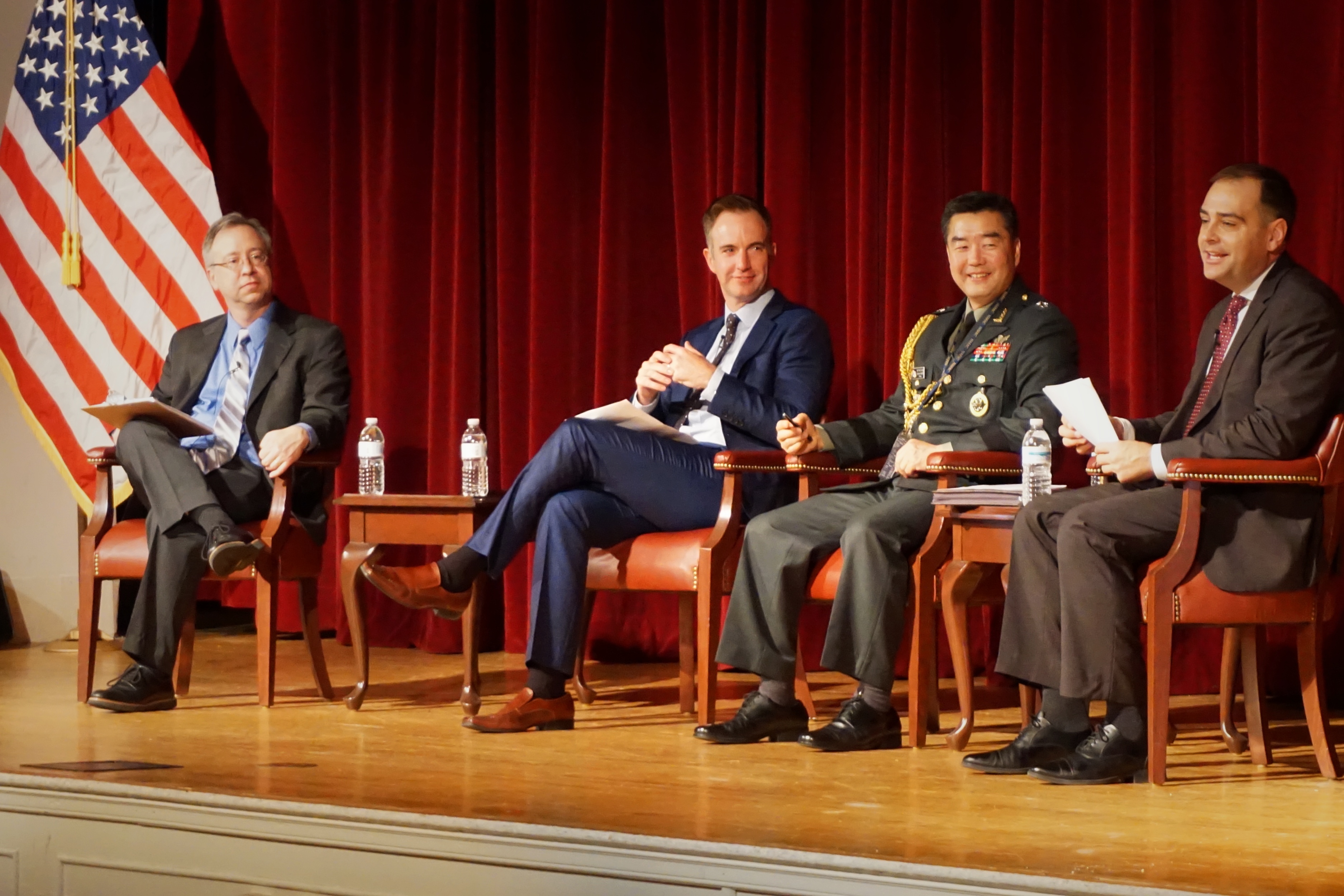
Brimley began by characterizing the situation the Trump Administration inherited. On the positive side, Brimley explained, the killing of Osama Bin Laden showed the growth of the special ops community and their capabilities, alliances in the Asia-Pacific are stronger and more resilient after the Obama Administration’s rebalance, and finally, the international system is currently free of outright great power conflict. On the negative side, the conflicts in Iraq and Afghanistan rage on and continue to be complicated, the reduction of forces in Iraq was possibly too steep and sowed seeds for the rise of ISIS, and the United States’ strategy in Syria remains opaque, particularly with regard to the fate of the Assad regime.
With respect to Russia and China, Brimley expressed concern but not surprise at their actions, as he believes them to be rational actors pursuing their respective interests. Russia, he explained, is testing the limits of their ambitions, but remains a deeply weak country – the problem as Brimley sees it is how to deal with Russia as a declining world power. As for China, Brimley concluded that they are indeed an emerging great power, but articulated that China isn’t seeking to create tension for tension’s sake, but rather in the pursuit of perceived real national interests. China’s assertive behavior, Brimley summarized, is rational and predictable.
Mr. Brimley went on to typify the military operational environment. He explained that the modest increase in the defense budget proposed by the Trump Administration won’t eliminate tough choices for DoD. For instance, the Navy must decide on what it wants as a service, as must the other services, and no amount of money will preclude these choices. Lastly, Brimley explained that the days of uncontested technological superiority are over for the U.S. – the world has changed and decision-makers must internalize this – qualitative superiority is no longer assured. Mass as an element of warfare, he concluded, will be increasingly important in an age of precise munitions.
Brigadier General Se Woo Pyo, Republic of South Korea Defense Attache to the United States and 1990 graduate of West Point, was queried on how the world had changed in the 30 years since he began his service in defense of the Republic of Korea. His answer, which he characterized as almost “too easy,” was that the situation on the Korean Peninsula had not actually changed much at all. The strategic environment has not changed, he said; the Cold War still exists on the Korean Peninsula and along the DMZ – the two sides have been at a tense standoff this entire time. The cost has been high for South Koreans: North Korea (DPRK) sunk the South Korean Corvette Cheonan, bombarded the South Korean Western Islands, and precipitated other incidents in which South Korean lives were lost. The Republic of Korea was determined to retaliate, General Brigadier General Se Woo Pyo explained, and field commanders were given authority to fire on DPRK positions in response to incoming rounds.
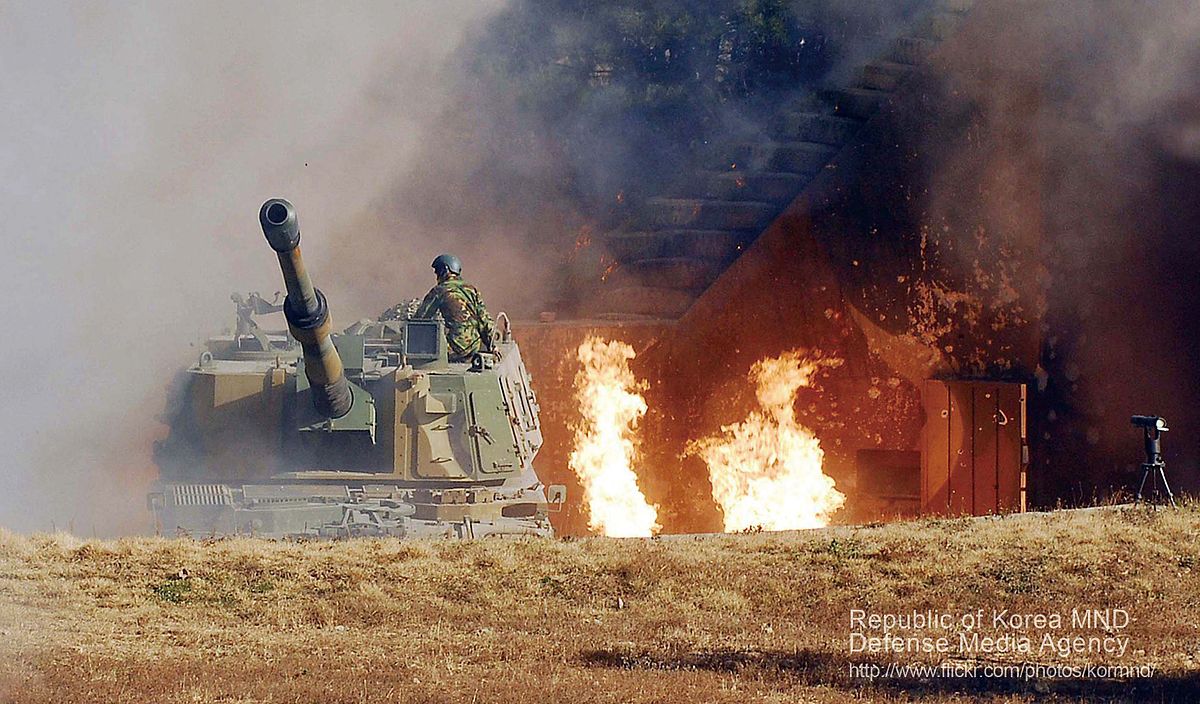
The intent of this South Korean posture is not to start a war but to deter – “[they] are very careful to deter by showing willingness and capability [to act], but simultaneously resisting a skirmish that would move into full-scale war. This kind of environment, Brigadier General Se Woo Pyo went on to describe, informs the sensitivity of ROK leaders and citizens to action against North Korean provocation.
With regard to the recent movement of the USS Carl Vinson Carrier Strike Group (CSG), the General emphasized concern and close communications between U.S. and Korean leadership. When the CSG moves into the Western Pacific, however, speculation occurs in the South Korean press regarding unilateral action by the U.S., crisis and war, despite these close consultations. The public perception in South Korea, he articulated, does not reflect this reality and is hard to control. Indeed, the Korean Peninsula still experiences Cold War concerns and dynamics to this day.
The general was also careful to point out changes since the Cold War. The rise of China and continued influence over neighboring states is the primary concern of Koreans, he stated, while Russia is no longer a huge concern or determining factor in Korean decision-making. Competition between China and the U.S. will shape almost all foreign policy decisions for other nations. General Se Woo Pyo was careful to point out that he doesn’t think China espouses one core value that other nations will strive for. Hardware doesn’t lend great power status – “software” remains extremely important, and in that sense, he explained, the U.S. has the advantage.
Conclusion
While the morning keynote came off as light, digestible, and thoughtful, the afternoon panel’s tone proved more somber and a little surprising. In some ways, the spoken points of Dr. Ruger and Dr. Brimley echoed the foreign policy debates of the election cycle. Ruger repeatedly reasserted his misgivings about the U.S.-led alliance system, but did not clearly articulate what those misgivings were. Likewise, Dr. Brimley, while appearing more mainstream in his views of the use of American power abroad, forwarded his own dreary assessment of the likelihood of funding the defense accounts to a level that would assure continued American access. Of the three, it appeared Brigadier Pyo maintained the most nuanced view, reciting a vivid recollection of the shared U.S.-Korean experience and what the alliance meant to his people and to stability in East Asia.
More to follow from NAFAC.
Sally DeBoer is the President of CIMSEC for 2016-2017. She can be reached at president@cimsec.org.
Mike DeBoer is a naval officer and regular contributor to CIMSEC.
Special thanks to the MIDN Danny Vegel and his Midshipmen PAO staff for the photos used in this post.

